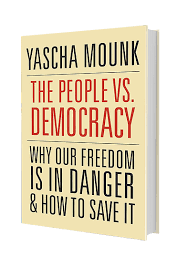Project Description
Yasha Mounk
The People vs. Democracy

Yascha Mounk burst onto the political science scene a couple of years ago when he published two worrisome articles in democratization with Roberto Stefano Foa which got a lot of play in the media. Many of us have been waiting for Mounk’s book ever since to see how he would expand on those ideas.
 When The People vs. Democracy was published a few weeks ago, it did not disappoint.
When The People vs. Democracy was published a few weeks ago, it did not disappoint.
Mounk brings a few intriguing attributes to the growing literature on the threats facing modern democracy. First, he is quite young (born in 1982) to be taken on so vast a topic. Second and perhaps more importantly, he is both German and Jewish, and both of those perspectives shape his work.
The most important thing that Mounk (and other authors of his ilk) as us to do is to sit up and take notice of the fact that democracy is in some trouble in Europe and the United States. Perhaps because he is so young, he seems to be saying something that my older generations of academics and activists have taken more or less for granted—that with more progress democracies would only get more secure.
Like other comparativists and Americanists Mounk raises a now familiar litany of problems, including the rise of populism, gotcha politics, and a tendency for leaders on all sides of the political spectrum to promote simplistic solutions while demonizing their political opponents.
In the end, Mounk emphasizes two key points to the litany of problems others have written about:
- The fact that dissatisfaction with liberal and democratic practices (which he shows are not exactly the same despite their overlap) is declining in part because elites of all sorts have grown more distant and seemingly more arrogant from average citizens. It’s not just elected officials, but civil servants, corporate executives, judicial leaders, and others who are both more important and harder to hold accountable. In particular, he cites the European Union in developing his notion of undemocratic liberalism.
- Support for democracy is most worrisome among his own generation of millennials. Many of us have a tendency to place a lot of hope in the next generation. However, Mounk presents depressing evidence indeed that young people are less likely than their elders to see democracy as the only viable political system or to rule out the possibility of rule by a strong man (or woman).
Like other authors writing in this space, Mounk does not have much trouble charting a series of plausible solutions, including presenting voters with positive messages that take the complexity of modern life into account, taming modern nationalism and the demonizing of “the other,” reducing economic inequality, and paying more attention to civic education.
As peacebuilder as well as a political scientist, I find it hard to see those outcomes emerging from the national elites that Mounk is so worried about. Rather, they will probably be built on the basis of local, “bottom up” initiatives that are rarely studied by academic political scientists.
And, to be fair, the few such initiatives that do exist are scattered around Europe and North America. No one has yet tried to intentionally create or coordinate them, let alone take them to scale to produce the kinds of policy changes Mounk endorses.
That’s the challenge my colleagues and I have begun to take on.
